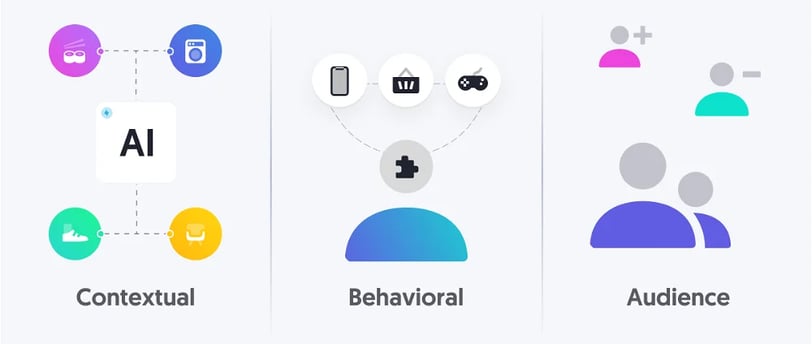Contextual Targeting: Reshaping Ad Placement in the Privacy Era
Discover how contextual targeting is revolutionizing digital advertising by placing ads based on content context rather than personal data. This privacy-conscious approach offers enhanced ad performance and brand safety while navigating evolving privacy regulations.
ADOPS
Matt H
6/4/20243 min read


Privacy concerns and evolving regulations are reshaping the landscape of digital advertising, prompting a quest for innovative targeting methods that prioritize user privacy without compromising effectiveness. In response to this challenge, contextual targeting has emerged as a promising solution. By analyzing the context of the content being consumed rather than relying on personal data, contextual targeting offers advertisers a privacy-conscious approach to ad placement. This method, which focuses on the relevance of ads to the surrounding content, not only addresses privacy concerns but also holds the potential for improved ad performance and media revenue.
Understanding Contextual Targeting:
Contextual targeting involves placing advertisements based on the context of the content being viewed or consumed by users. Instead of relying on user data such as browsing history, demographics, or previous behavior, contextual targeting analyzes the content of the webpage, app, or video being accessed. It considers factors such as keywords, topics, language, sentiment, and even the overall theme or tone of the content. By understanding the context in which the content exists, advertisers can strategically place relevant ads that resonate with the audience's interests and intentions at that moment.
Advantages of Contextual Targeting:
Privacy Compliance: Contextual targeting eliminates the need for collecting and storing personal data, addressing concerns related to privacy and data protection regulations such as GDPR and CCPA. Since ads are served based on the content context rather than individual user profiles, there's no risk of compromising user privacy.
Relevance and Engagement: By aligning ads with the content being consumed, contextual targeting ensures greater relevance and resonance with the audience. Users are more likely to engage with ads that complement the content they are already interested in, leading to higher click-through rates and conversions.
Brand Safety: Contextual targeting enables advertisers to ensure their ads appear alongside relevant and brand-safe content. By avoiding placement on sensitive or inappropriate content, advertisers can protect their brand reputation and maintain trust with their audience.
Enhanced Performance: Studies have shown that contextual targeting can lead to improved ad performance metrics such as click-through rates, conversion rates, and return on ad spend (ROAS). By reaching users in the right context, advertisers can maximize the effectiveness of their campaigns and achieve better results.
Flexibility and Adaptability: Contextual targeting offers flexibility in targeting options, allowing advertisers to adjust their strategies based on changing trends, events, or audience preferences. It enables real-time optimization and nimble responses to dynamic market conditions.
Challenges and Considerations:
While contextual targeting offers numerous advantages, it also presents some challenges and considerations for advertisers:
Contextual Ambiguity: Interpreting the context of content accurately can be challenging, especially in cases where the meaning or sentiment is ambiguous. Advertisers need sophisticated algorithms and technology to ensure ads are placed in the most relevant and appropriate contexts.
Limited Audience Insights: Unlike behavior-based targeting, which provides detailed insights into user preferences and behaviors, contextual targeting offers limited audience insights. Advertisers may have less understanding of the audience they are reaching and may need to rely on broader audience segmentation strategies.
Scale and Reach: Achieving scale and reach with contextual targeting can be more challenging compared to behavior-based targeting, which leverages extensive user data. Advertisers may need to diversify their targeting strategies and invest in partnerships with a wide range of publishers to reach their desired audience effectively.
Evolving Technology: Contextual targeting relies heavily on advancements in natural language processing (NLP), machine learning, and artificial intelligence (AI) to analyze and understand content context accurately. Advertisers must stay abreast of technological developments and invest in cutting-edge solutions to ensure the effectiveness of their contextual targeting efforts.
The Future of Contextual Targeting:
Despite its challenges, contextual targeting is poised to play a significant role in the future of digital advertising. As privacy regulations continue to tighten, and consumer awareness regarding data privacy grows, advertisers will increasingly turn to contextual targeting as a privacy-friendly alternative. Advancements in AI and machine learning will further enhance the accuracy and effectiveness of contextual targeting, enabling advertisers to deliver highly relevant and engaging ads to their target audience.
Conclusion:
Contextual targeting represents a paradigm shift in digital advertising, offering advertisers a privacy-conscious and effective alternative to behavior-based targeting. By placing ads based on the context of the content being consumed, advertisers can achieve greater relevance, engagement, and brand safety while respecting user privacy. While challenges exist, technological advancements and evolving industry practices are driving the adoption of contextual targeting as a viable and sustainable approach to ad placement in the digital age. As advertisers navigate the changing landscape of privacy regulations and consumer preferences, contextual targeting stands out as a beacon of innovation and opportunity in the quest for effective and responsible advertising practices.
Location
USA: 473 Mundet Place
Ste US682151, Hillside, New Jersey - 07205
India: The Ops Partner, 4th B Cross Road, Yelahanka New Town - 560064
Hours
Available 24*5 (Monday - Friday)
